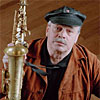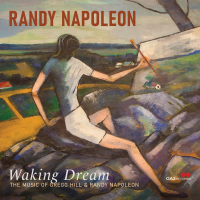Home » Jazz Articles » Interview » Alexa Tarantino: Passion For Playing And Teaching
Alexa Tarantino: Passion For Playing And Teaching

I'm still in awe of is the fact that we're creating moments that will never happen again. Every gig.
—Alexa Tarantino
Her career includes playing sax on stage before age of 20 with

Earth, Wind & Fire
band / ensemble / orchestra
Jazz at Lincoln Center Orchestra
band / ensemble / orchestra
Arturo O'Farrill
pianob.1960

Cecile McLorin Salvant
vocalsb.1989
That's a pretty full resume for someone bitten "at an early age." That age is relative. The space between discovering the music and becoming a professional discovering her potential is not vacuous. The woman who has compiled these accomplishments already is only 28.
"I knew from a young age I wanted to do this professionally," she says, looking back on her beginnings in a small town near Hartford, CT.
What drew her to jazz was that it was "such a raw form of self expression through an instrument. Also the freedom you find in jazz, with improvisation and creativity and composition. Communicating with others on the bandstand. That type of freedom was really exciting to me. Now, to this day, what I'm still in awe of is the fact that we're creating moments that will never happen again, Every gig. Even every lesson. Every master class. Every performance. With improvisation, it's never going to be repeated the same way."
Things have slowed a bit because of the coronavirus situation. But Tarantino, a driven woman who doesn't sit still for long if she doesn't have to, still pushes forward, finding ways to adapt. She remains exuberant. She has a new CD out, Clarity (Posi-Tone), that is continuing to cement her reputation as a fine player. Her killer band on the disk is comprised of

Steven Feifke
pianob.1991

Joe Martin
bassb.1970

Rudy Royston
drumsPutting it all together takes a great deal of persistence and effort. But Tarantino is indefatigable. Outwardly, it's just part of her daily life, working on her mission to bring music and music education to the people.
Tarantino's path started with her taking up the piano and saxophone at the same time, around the age of 10, with the full support of family. "In the community, jazz was a big deal," she says. "The music program was incredible. I had many, many opportunities." When listening to music as a child, jazz was always in the forefront. She also enjoyed music of Motown, The Temptations,

Stevie Wonder
vocalsb.1950

Ella Fitzgerald
vocals1917 - 1996

John Coltrane
saxophone1926 - 1967
"When I was in elementary school, my family and I went to see one of the local high school jazz concerts. I was probably 9. I saw a young woman playing a ballad, a featured saxophone ballad with the big band. That's when I said, 'I wanna do that.'" Soon, she was in the elementary school jazz band and continued those studies up through Hall High School, whose alumni includes

Brad Mehldau
pianob.1970

Phil Woods
saxophone, alto1931 - 2015

Dexter Gordon
saxophone, tenor1923 - 1990

Charlie Parker
saxophone, alto1920 - 1955

Cannonball Adderley
saxophone1928 - 1975

Nancy Wilson
vocals1937 - 2018

Kenny Garrett
saxophone, altob.1960

Dick Oatts
saxophone, altob.1953
She left Eastman with a degree in jazz performance and music education; also a music business certificate. Later, after becoming a freelance musician in New York City, she earned a master's degree from Julliard, which she finished in 2019.
At Eastman, she made her first record, an independent production called Crossing Paths with one of Eastman's piano faculty members, Dariusz Terefenko. With Terefenko she toured and taught as an artist-in-residence at various universities. They even went to Poland and taught at the Academy of Music in Krakow for a couple of weeks during Tarantino's final year of college.
"My studies kept me busy, but there were a few groups, either led by faculty members or students, that would have regular weekly gigs," she says. "There were a lot of teaching opportunities. It was a great place to break into freelancing."
It was in college she picked up valuable lessons about leading bands. "That's where I started doing stuff just with my quartet. I did a little bit of quintet as well. On my last record, Winds of Change (Posi-Tone, 2019), there were a couple of quintet tunes with

Nick Finzer
tromboneb.1988
After the school year ended, she would stay in town for the Rochester International Jazz Festival held in the summertime. Staying for the festival after her graduation proved fortuitous. "Earth, Wind and Fire was the headlining band. Through an amazing sequence of events I ended up playing with them during their concert. That was kind of my graduation," she recalls with a chuckle. "

Philip Bailey
vocalsAfter Eastman, Tarantino was "getting sort of recruited by

Sherrie Maricle
drumsb.1963
Recalls Tarantino, "So I went to the Deerhead Inn in Delaware Water Gap (PA), which is where Phil Woods was living at the time. I remember driving several hours from Rochester to Pennsylvania. I had been working on the music forever. They sent it to me a couple weeks ahead of time. I was eating, sleeping and breathing it because I wanted to get the gig. It was my first non-Rochester band to have the opportunity to play with. We had a great time and they asked me to join the band. The band was touring pretty significantly at that time."
A smaller group split that off from the band was also working with tap dancer Maurice Hines' one-man show, which toured, and then settled in off-Broadway in Manhattan. "That was when I made the decision to move permanently to New York. That was before Julliard." In the Big Apple, she started teaching at Jazz at Lincoln Center and doing some work for them. "In that time with DIVA, the year before I started Julliard, I was hanging out in New York and going to clubs," Tarantino says. "Mostly I was hanging out at Dizzy's Club, at Jazz at Lincoln Center. That's when I started doing some work with

Wynton Marsalis
trumpetb.1961
Tarantino was undeterred. "Between DIVA and some things with Wynton and Jazz at Lincoln Center and teaching, I had a pretty full plate. I was trying to get my name out as much as I could. When I went to Julliard, I wasn't able to go out all the time. I was trying to take all the gigs I could get and get to class also," she says.
She also pursed her own projects as time allowed. And there were other great opportunities.
"For two years I was in Arturo O'Farrill's Afro-Latin Jazz Orchestra. They did a fair amount of touring. I also started working with

Darcy James Argue
composer / conductorb.1975
"That was all happening during Julliard. The Wynton stuff, the Arturo stuff, Darcy, Cecile, Arturo and my own stuff. It was a mad, crazy schedule in terms of trying to make sure I was focused in school and making all my classes. I really wanted to prioritize that. But at the same time, if these amazing opportunities came up, I couldn't say no. I was very fortunate that my teachers and my professors were really helpful. I learned a lot and they also understood what I was up to."
O'Farrill's band became quality opportunity for Tarantino in a setting involving the exotic rhythms and music from the Latin genre. "I loved playing with that band. I spent two years with them and I just recently moved on because I'm trying to do more touring with my own group as a quartet. We had so much fun. We did some great tours. Great traveling. The music is incredible. I love playing that classic style like

Tito Puente
drums1923 - 2000

Machito
vocals1909 - 1984

Chico O'Farrill
composer / conductor1921 - 2001
She adds, "I really gravitated toward the old-school classics. In the beginning of my time with the band, I sat next to

Bobby Porcelli
saxophoneb.1937

T.S. Monk
drumsb.1949
It was only about a year ago that those gigs ran their course for the most part, as Tarantino pressed on with her own work. The relationships, however, are invaluable and cherished.
She says Marsalis is among her most valued mentors. "I actually met him in high school. Hall High School went to compete at Jazz at Lincoln Center in an Essentially Ellington program, a competition they hold every year. I made a point to reconnect at Jazz at Lincoln Center when I officially landed in New York. That's when I started teaching for them, in their youth education program [Jazz for Young People] ... We are still in touch." She did some online work for Jazz at Lincoln Center's programs during the quarantine, hosting a weekly show for awhile. Last year, she went with the trumpeter to France to play with his septet at Jazz in Marciac. "He's been really great to me."
She also worked with baritone saxophonist

Lauren Sevian
saxophone, baritoneb.1979
Working with a singer, and a great one in Salvant, has also been enlightening for Tarantino. She says the award winning vocalists works in a unique way—not at all as a star who just needs musicians behind her for support.
"I don't even think of her as a vocalist. A lot of people have a stereotype of what working with a vocalist is. Working with DIVA, we would occasionally do cabaret-style things, or things where you're the backing band for a vocalist ... I also did something with

Kurt Elling
vocalsb.1967

Ulysses Owens, Jr.
drumsb.1982

Dee Dee Bridgewater
vocalsb.1950
"But with Cecile, it's different. It doesn't feel like there's any real forefront or back burner. It's all one living, breathing organism. With her Ogresse show, with her and Darcy, it's the most incredible fairytale narrative. It's like a drama, with a story line and really intense, beautiful music. You're always focused. I play six instruments in that project, so I'm always focused," she says, gleefully. "I never feel like I'm on the back burner. Everyone is in it 100 percent. She's very creative and always very focused on instrumentalists. I just love the atmosphere she created. It's been a real joy to work with her."
Tarantino plays flute with Salvant, and has expanded to use that instrument more in other projects. She plays with a full, luscious tone and creates beautiful, soulful sounds. It's a sweet change of pace that enhances her overall presentation and musicianship. Some of that can be heard on her new recording.
"I love playing flute and I love doubling. I love woodwind doubling. At one point last year, on Winds of Change, we decided to do one tune on alto flute. It was an 'ah-hah' moment that I wanted to do more playing as a flutist in a jazz setting. On most of my gigs now as a leader, I'll play alto and soprano (sax) and flute, or alto saxophone and flute and alto flute. So I keep it in the mix. I think it brings a really nice texture and nice change to the ensemble. A new mood. It's beautiful to play with," she says.
The new recording, her second as the clear leader, separates Tarantino the composer and performer from someone who plays other music in other people's bands—as great as those experiences have been.
"When I finished Julliard, I made a little bit of a mental shift. I said, 'OK, what is my music going to sound like? What can I do with my band? What creative projects can I start to brainstorm and collaborate?' Definitely not trying to turn away from any of those sideperson collaborations, because I love them all. But just putting more of the focus on my compositions and what I can contribute as a band leader.
"I think that's where Clarity comes from," she says. "I had gathered all these experiences from all these different people. As I continue working with them, and hopefully with others, I'm trying to put everything together and clarify my own music ideas and opinions and express my own thing."
She says the recording came together easily in the studio. "The band was awesome. A lot of this music I actually wrote leading up to the session. Some of the tunes I chose because they are some of my die-hard favorites. 'My Ship' and 'Gregory's Here' are two non-original compositions that I just love. I love the melodies and I love the vibe."
"Through," she says, is a modal song she wrote to showcase the flute in an edgier, more abstract setting. "Thank You For Your Silence" is her composition to remind herself she doesn't have to please everyone all the time. There are also tunes that were commissioned for the album as well. Each are carried out with intensity and passion. The band is tight and fiery.
"This record it was sort of: I want to show people my writing and I want to present music that is me. I also wanted to pick a couple of things that just make me smile. With the contrast between my originals and those standards, we put it all together."
Tarantino was looking forward to releasing the CD at events this year, including the Rochester jazz festival. It's not possible now with the virus situation. Summer dates with Salvant and with Ulysses Owens Jr. were canceled, as well as some teaching gigs.
Under quarantine, she has been presenting Sunday night concerts, live-streamed through Crowdcast, with Feifke. Part of the proceeds are donated to organizations with emergency artist relief funds.
"That's what we've been doing to keep things moving. Before each concert we do a pre-concert conversation that's open to everybody and we answer questions and talk about the theme of the music for that night and our approach to the music. Every week is different. We did a Coltrane night, we did a

Gerry Mulligan
saxophone, baritone1927 - 1996
The Step Ahead jazz camp will keep her busy and involved in education, which is important to the young musician. "That, with performing—It's my mission to do both as much as possible."
"I try to combine education into my tour dates as much as I can (through "visiting artist" types of things). Also, I'm into the entrepreneur aspect of the business and how to drive your own success, create your own work, instead of relying on others. It's important to have many different avenues going."
Tarantino has a vision about her future, which portends to be long and fruitful.
"I would love to keep touring and performing with the amazing people I'm fortunate to work with. I love traveling and meeting people from all over. I'd love to do that more with my own group. Also continue the education. Down the line, I'd love to take a little bit of an ambassador role for the music, whether that be expanding my summer jazz program or getting more involved at an arts organization as some kind of artistic director or something like that. I'd like to be involved as much as I can throughout the community and in jazz education."
Photo courtesy of Alexa Tarantino
Tags
Comments
PREVIOUS / NEXT
Alexa Tarantino Concerts

Jazz at Lincoln Center Orchestra with Wynton Marsalis
Wharton Center For Performing ArtsEast Lansing, MI
Support All About Jazz
 All About Jazz has been a pillar of jazz since 1995, championing it as an art form and, more importantly, supporting the musicians who make it. Our enduring commitment has made "AAJ" one of the most culturally important websites of its kind, read by hundreds of thousands of fans, musicians and industry figures every month.
All About Jazz has been a pillar of jazz since 1995, championing it as an art form and, more importantly, supporting the musicians who make it. Our enduring commitment has made "AAJ" one of the most culturally important websites of its kind, read by hundreds of thousands of fans, musicians and industry figures every month.








 Buy Now
Buy Now

















